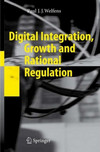

Most ebook files are in PDF format, so you can easily read them using various software such as Foxit Reader or directly on the Google Chrome browser.
Some ebook files are released by publishers in other formats such as .awz, .mobi, .epub, .fb2, etc. You may need to install specific software to read these formats on mobile/PC, such as Calibre.
Please read the tutorial at this link: https://ebookbell.com/faq
We offer FREE conversion to the popular formats you request; however, this may take some time. Therefore, right after payment, please email us, and we will try to provide the service as quickly as possible.
For some exceptional file formats or broken links (if any), please refrain from opening any disputes. Instead, email us first, and we will try to assist within a maximum of 6 hours.
EbookBell Team

5.0
78 reviewsThis book focuses on the role of information and communication technologies for economic integration, networking and growth. Technological and regulatory dynamics are highlighted with respect to EU countries and the US.
The analysis deals with the main issues of rational regulations in open economies. Schumpeterian developments and dynamic efficiency gains are crucial for Europe in the context of telecommunications competition and network modernisation – achieving the goals of the Lisbon Agenda requires adequate incentives for investment and solid capital market prospects. Economic progress in the digital knowledge society will be characterised by enormous structural change and the growth of digital services. New policy conclusions at both the national and international levels – including welfare analysis – are presented.